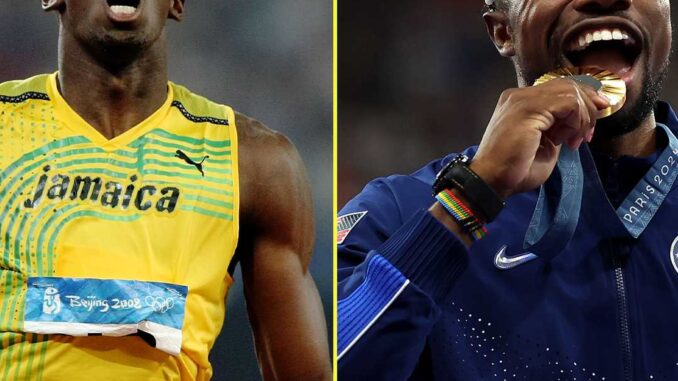
When Noah Lyles stood in front of the cameras after his blistering 9.76s victory, the athletics world expected humility, respect, and perhaps a nod to the Jamaican sprint king who defined an era. Instead, Lyles looked straight into the lens, smiled, and dropped a bombshell that no one saw coming: “I’m not Usain Bolt… I’m something GREATER.”
In an instant, the words traveled like wildfire across social media. Clips of the interview went viral, fans were tagging Bolt, and the internet began buzzing with heated debates. Some hailed Lyles’ boldness, arguing that his dominance on both the 100m and 200m tracks, combined with his World Championship titles, justified the audacious claim. Others called it blasphemy, warning that there will never be another Bolt — the man who turned sprinting into a global spectacle and still holds the world records of 9.58s and 19.19s.
But the story did not end there. Hours later, Usain Bolt, never one to shy away from a challenge, broke his silence. The Jamaican icon posted a short but thunderous message on X (formerly Twitter): “Talk is cheap. Records don’t lie. I’m still the fastest man alive. Until you take 9.58 from me, sit down.”
And just like that, the war was on.
Fans flooded comment sections, passionately defending their champion. Bolt loyalists pointed to the Jamaican’s three consecutive Olympic sprint doubles — Beijing 2008, London 2012, Rio 2016 — an achievement unlikely to be repeated in our lifetime. They reminded everyone that Bolt was not just a sprinter; he was an entertainer, a showman who carried the entire sport on his shoulders and inspired a generation to run.
On the other side, Lyles’ supporters argued that greatness is not just about times on the clock but about rewriting the narrative. They pointed out that Lyles has faced tougher competition in an era where sprinting is more global than ever, with young challengers from Africa, the Caribbean, and the U.S. breathing down his neck every race. They claimed his confidence is what the sport needs — someone bold enough to chase the impossible.
Track and field analysts are now openly debating if this rivalry could become the next great storyline for the sport. Could Lyles ever get close to Bolt’s records? Could he surpass him in legacy, if not numbers? The clash between these two icons has injected fresh drama into athletics, bringing more eyeballs and more energy than the sport has seen since Bolt’s retirement.
One thing is certain — the throne of speed is no longer a quiet place. With Lyles calling himself “greater” and Bolt refusing to give up his crown, fans are witnessing a rare, raw battle of pride and legacy. The world will be watching every race from now on, because this is no longer just about sprinting — it’s about history being written in real time.
Be the first to comment